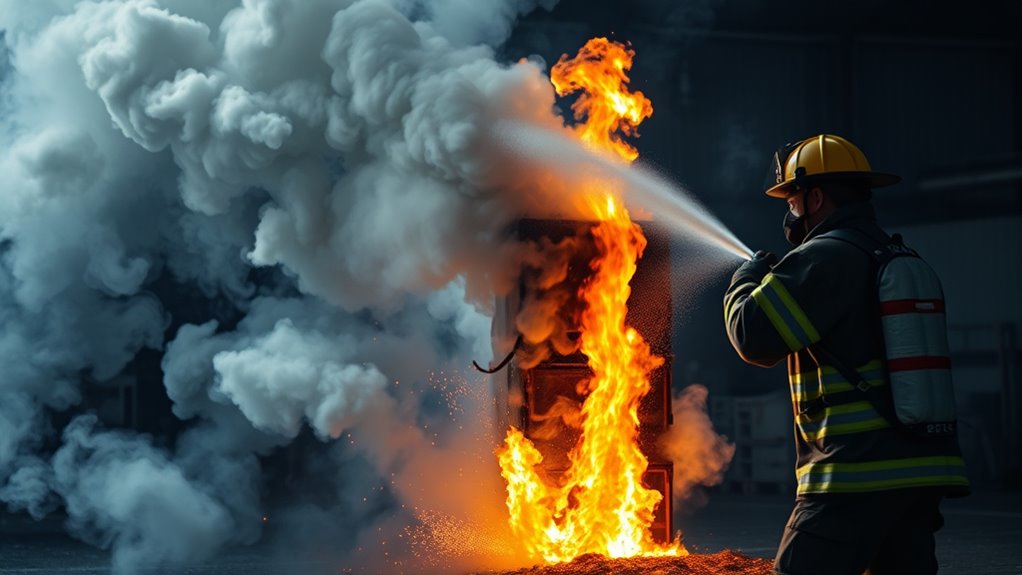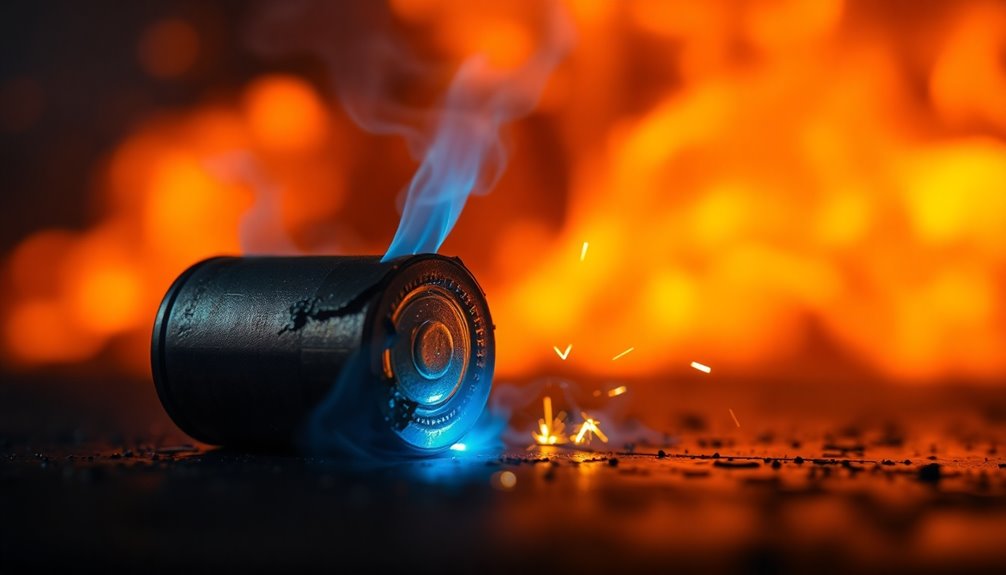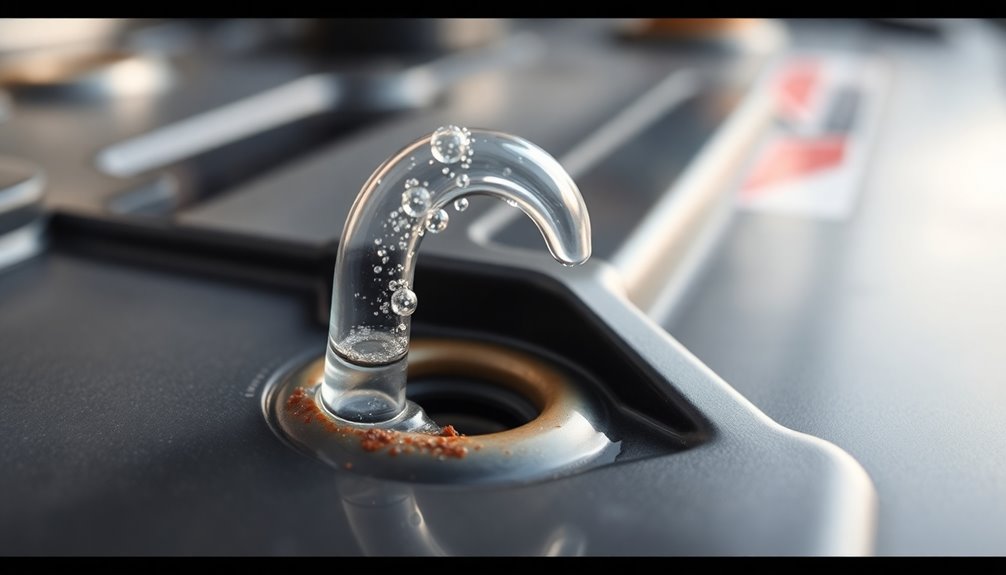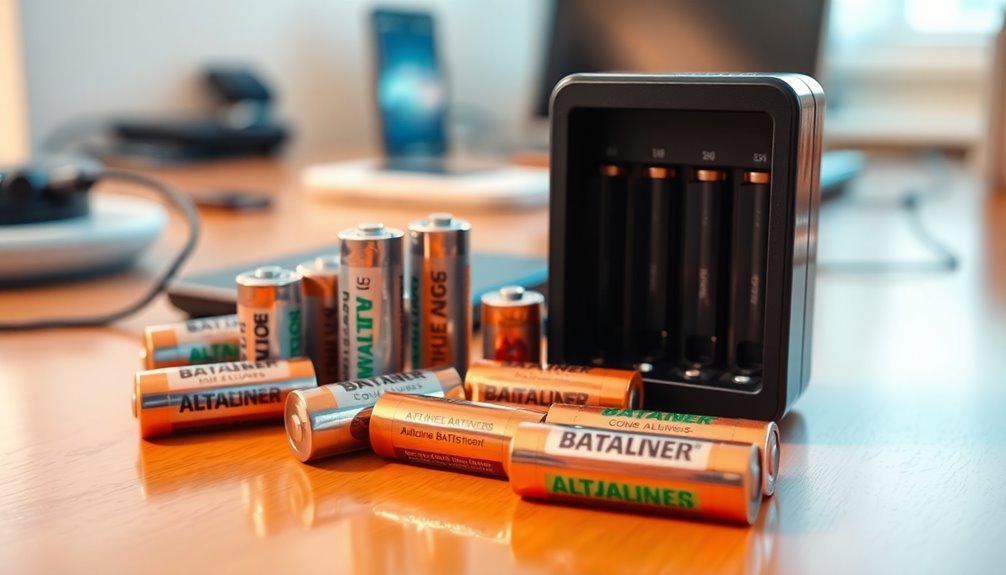If a lithium pack starts to smoke, stay calm and act quickly. Keep a safe distance, alert others nearby, and call emergency services immediately. Avoid trying to open or puncture the battery, and use a fire extinguisher rated for electrical fires if you have one nearby. Do not use water, as it reacts violently with lithium. Prioritize safety and proper fire suppression techniques—you’ll find essential steps to handle this situation effectively if you continue.
Key Takeaways
- Remain calm, alert others, and call emergency services immediately.
- Keep a safe distance; do not attempt to open or puncture the battery.
- Use a Class C or ABC fire extinguisher to suppress small fires at the base.
- Evacuate the area if smoke, fumes, or fire become uncontrolled or intense.
- Ventilate the area only after ensuring the fire is fully extinguished and safe to enter.
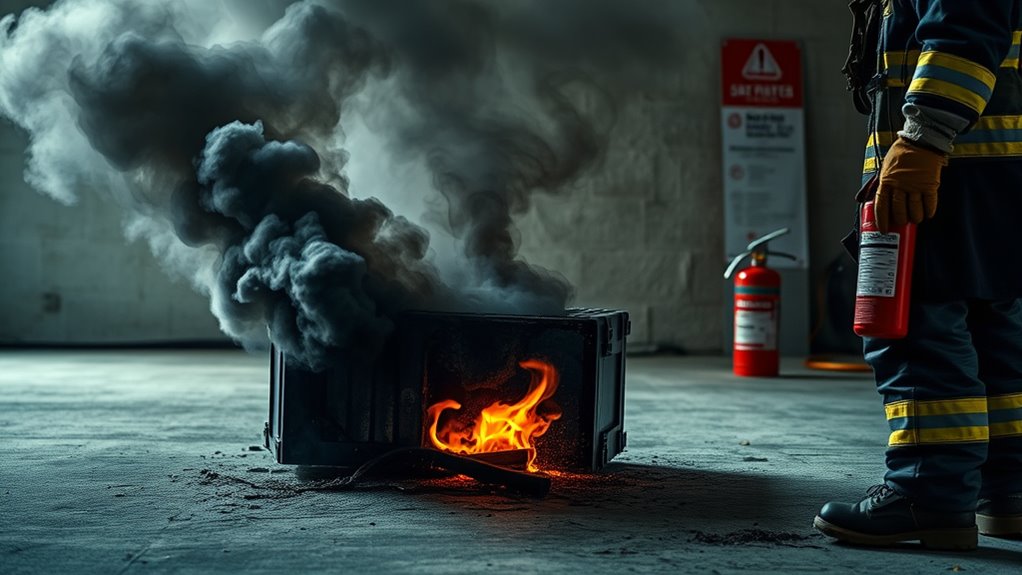
Have you ever wondered what it takes to respond effectively during an emergency? When a lithium pack starts to smoke, your immediate actions can make all the difference in preventing injury or property damage. Recognizing the danger signs and knowing how to act swiftly is essential, especially since these incidents often involve fire safety and chemical hazards. Lithium batteries contain flammable chemicals that can ignite suddenly, releasing toxic fumes and intense heat. Your first priority is to remain calm and avoid panic, as a clear head helps you make smarter decisions.
Respond quickly and calmly to lithium battery smoke to prevent injury and property damage.
The moment you see smoke or smell a chemical odor, you should alert others nearby and call emergency services. While waiting for help, keep a safe distance from the device to avoid exposure to hazardous fumes or potential explosion. Do not attempt to open or puncture the battery, as this can worsen the situation by releasing more chemicals or igniting a fire. Instead, if you have access to a fire extinguisher rated for electrical fires—typically a Class C or a multipurpose ABC extinguisher—you should carefully use it to suppress the flames. Remember, never use water on a lithium battery fire; water can react violently with lithium, causing the fire to spread or explode.
If a fire extinguisher isn’t available, and the fire is small enough, you might consider smothering the flames with a fire-resistant blanket or sand, cutting off the oxygen supply. However, be cautious: chemical hazards from the battery’s contents can cause harmful fumes, so always prioritize safety and minimize exposure. Ventilate the area if possible, but only after the fire is out and it’s safe to do so. If the smoke is intense or the fire is out of control, evacuate immediately and let professionals handle the situation. Do not attempt to move the burning battery unless you are trained and equipped for such tasks; moving it could cause further damage or spills. Additionally, understanding the contrast ratio of your equipment can help you better gauge the severity of the situation and plan an appropriate response.
In any emergency involving a smoking lithium pack, understanding fire safety protocols and chemical hazards allows you to act swiftly and responsibly. Your quick response can contain the incident, reduce risks, and protect everyone nearby. Remember, safety isn’t just about reacting in the moment—it’s about staying informed, prepared, and cautious to prevent escalation and ensure the well-being of yourself and others.
Frequently Asked Questions
Can Lithium Battery Smoke Cause Long-Term Health Issues?
You wonder if lithium battery smoke can cause long-term health issues. While inhaling smoke from a lithium pack can expose you to harmful chemicals, proper battery safety minimizes these risks. Breathing in smoke may lead to respiratory irritation and other health risks, especially with repeated exposure. To stay safe, avoid inhaling the fumes, ventilate the area, and seek medical advice if you experience symptoms. Always prioritize battery safety to protect your health.
How Do I Identify a Lithium Pack Fire Early?
To identify a lithium pack fire early, watch for signs like battery overheating and unusual heat buildup. Pay attention to smoke color detection; white or gray smoke often indicates a thermal runaway, while black or dark smoke suggests burning materials. If you notice these signs, act quickly by disconnecting the battery and moving to a safe area. Early detection helps prevent serious damage and health risks.
Are There Any Home Remedies for Lithium Smoke Inhalation?
If you experience lithium smoke inhalation, home remedies aren’t enough; you need professional inhalation treatment. However, to reduce exposure, move to fresh air immediately and stay there until symptoms lessen. You can also try deep breathing in clean air, but don’t delay seeking medical help. Remember, inhaling lithium smoke can be dangerous, so prioritize prompt medical attention over home remedies for proper care.
What Are the Legal Requirements for Disposal of Damaged Lithium Packs?
You might wonder about the legal requirements for disposing of damaged lithium packs. Typically, you’re required to follow strict rules for battery recycling and hazardous waste disposal. You can’t just toss them in the trash; authorities enforce proper procedures to prevent environmental harm and safety hazards. By adhering to local regulations, you guarantee safe, compliant disposal, avoiding fines and protecting communities from potential dangers lurking in damaged lithium batteries.
Should I Attempt to Extinguish a Lithium Fire Myself?
You shouldn’t attempt fire suppression yourself if a lithium battery catches fire. Lithium fires can escalate quickly and are difficult to extinguish safely. Prioritize personal safety by evacuating the area immediately and calling emergency services. Use a Class D fire extinguisher if trained and available, but don’t take risks. Remember, professional fire suppression is essential for safely handling lithium battery fires to prevent injury or further damage.
Conclusion
Remember, when a lithium pack smokes, act quickly and stay safe. Keep a fire extinguisher nearby, and never try to handle it alone. Did you know that lithium battery fires can reach temperatures over 1,000°F in seconds? By knowing the proper steps, you can prevent injuries and property damage. Stay prepared, stay alert, and always prioritize safety to effectively manage these emergencies.

